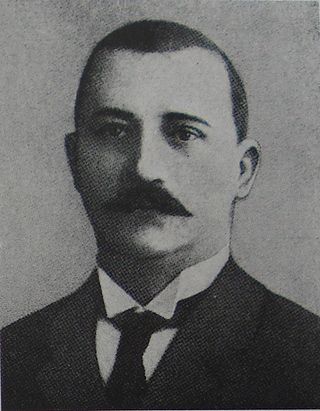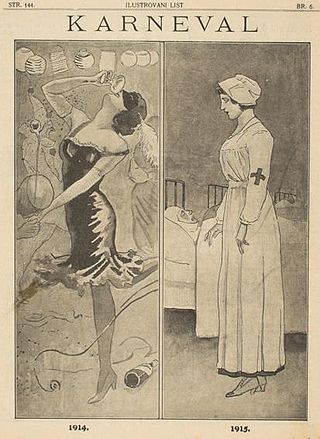Related Research Articles

The Kingdom of Yugoslavia was a country in Southeast and Central Europe that existed from 1918 until 1941. From 1918 to 1929, it was officially called the Kingdom of Serbs, Croats, and Slovenes, but the term "Yugoslavia" was its colloquial name due to its origins. The official name of the state was changed to "Kingdom of Yugoslavia" by King Alexander I on 3 October 1929.

The State of Slovenes, Croats and Serbs was a political entity that was constituted in October 1918, at the end of World War I, by Slovenes, Croats and Serbs (Prečani) residing in what were the southernmost parts of the Austro-Hungarian Empire. Although internationally unrecognised, this was the first incarnation of a Yugoslav state founded on the Pan-Slavic ideology. Thirty-three days after it was proclaimed, the state joined the Kingdom of Serbia and the Kingdom of Montenegro to form the Kingdom of Serbs, Croats and Slovenes.

The Corfu Declaration was an agreement between the prime minister of Serbia, Nikola Pašić, and the president of the Yugoslav Committee, Ante Trumbić, concluded on the Greek island of Corfu on 20 July 1917. Its purpose was to establish the method of unifying a future common state of the South Slavs living in Serbia, Montenegro and Austria-Hungary after the First World War. Russia's decision to withdraw diplomatic support for Serbia following the February Revolution, as well as the Yugoslav Committee's sidelining by the trialist reform initiatives launched in Austria-Hungary, motivated both sides to attempt to reach an agreement.

The State of Slovenes, Croats and Serbs became merged with the Kingdom of Serbia and the Kingdom of Montenegro to form the nation of Yugoslavia in 1918. The formation of Yugoslavia began with the formation of the Yugoslav Committee, a collection of mostly Croats, then Serbs and later Slovenes, whose goal was to form a single south Slavic state. In October 1918 the Croatian Parliament declared the Kingdom of Croatia-Slavonia as an independent state, which, in December that same year, incorporated into the State of Slovenes, Croats and Serbs, merged with Kingdom of Serbia and Kingdom of Montenegro and created the Kingdom of Serbs, Croats and Slovenes. The kingdom would be renamed to Yugoslavia in 1929, and ruled by Serbian Karađorđević dynasty till Second World War. After the formation of Yugoslavia, Serbia attempted to create a "Greater Serbia" by using police intimidation and vote rigging to establish a Serbian controlled Yugoslavia. From 1929-1941 Serbian controlled Yugoslavia established control over Croatia through Royal Yugoslav police force brutality and assassinations of important Croatians.

The Yugoslav Committee was a World War I-era, unelected, ad-hoc committee that largely consisting of émigré Croat, Slovene, and Bosnian Serb politicians and political activists, whose aim was the detachment of Austro-Hungarian lands inhabited by South Slavs and unification of those lands with the Kingdom of Serbia. The group was formally established in 1915 and it last met in 1919, shortly after the breakup of Austria-Hungary and the establishment of the Kingdom of Serbs, Croats and Slovenes, which was later renamed Yugoslavia. The Yugoslav Committee was led by its president the Croat lawyer Ante Trumbić and, until 1916, by Croat politician Frano Supilo as its vice president.

Ante Trumbić was a Yugoslav and Croatian lawyer and politician in the early 20th century.

Slavko Kvaternik was a Croatian Ustaše military general and politician who was one of the founders of the Ustaše movement. Kvaternik was military commander and Minister of Domobranstvo. On 10 April 1941, he declared the creation of the Independent State of Croatia and became Pavelic's right-hand man, the Doglavnik.

Frano Supilo was a Croatian politician and journalist. He opposed the Austro-Hungarian domination of Europe prior to World War I. He participated in the debates leading to the formation of Yugoslavia as a member of the Yugoslav Committee. The author, R. A. Stradling, calls him "one of the most capable Croatian politicians ever."

The prime minister of Yugoslavia was the head of government of the Yugoslav state, from the creation of the Kingdom of Serbs, Croats and Slovenes in 1918 until the breakup of the Socialist Federal Republic of Yugoslavia in 1992.

Yugoslavia was a state concept among the South Slavic intelligentsia and later popular masses from the 19th to early 20th centuries that culminated in its realization after the 1918 collapse of Austria-Hungary at the end of World War I and the formation of the Kingdom of Serbs, Croats and Slovenes. However, the kingdom was better known colloquially as Yugoslavia ; in 1929 it was formally renamed the "Kingdom of Yugoslavia".

Bogoljub Jevtić was a Serbian diplomat and politician in the Kingdom of Yugoslavia.

Yugoslavism, Yugoslavdom, or Yugoslav nationalism is an ideology supporting the notion that the South Slavs, namely the Bosniaks, Croats, Macedonians, Montenegrins, Serbs and Slovenes, but also Bulgarians, belong to a single Yugoslav nation separated by diverging historical circumstances, forms of speech, and religious divides. During the interwar period, Yugoslavism became predominant in, and then the official ideology of the Kingdom of Yugoslavia. There were two major forms of Yugoslavism in the period: the regime favoured integral Yugoslavism promoting unitarism, centralisation, and unification of the country's ethnic groups into a single Yugoslav nation, by coercion if necessary. The approach was also applied to languages spoken in the Kingdom. The main alternative was federalist Yugoslavism which advocated the autonomy of the historical lands in the form of a federation and gradual unification without outside pressure. Both agreed on the concept of National Oneness developed as an expression of the strategic alliance of South Slavs in Austria-Hungary in the early 20th century. The concept was meant as a notion that the South Slavs belong to a single "race", were of "one blood", and had shared language. It was considered neutral regarding the choice of centralism or federalism.
The Party of Rights was a Croatian nationalist political party in Kingdom of Croatia-Slavonia and later in Kingdom of Serbs, Croats and Slovenes.

The May Declaration was a manifesto of political demands for unification of South Slav-inhabited territories within Austria-Hungary put forward to the Imperial Council in Vienna on 30 May 1917. It was authored by Anton Korošec, the leader of the Slovene People's Party. The document was signed by Korošec and thirty-two other council delegates representing South-Slavic lands within the Cisleithanian part of the dual monarchy – the Slovene Lands, the Dalmatia, Istria, and the Condominium of Bosnia and Herzegovina. The delegates who signed the declaration were known as the Yugoslav Club.
The National Council of Slovenes, Croats and Serbs was a group of political representatives of South Slavs living in Austria-Hungary and subsequently in the short-lived State of Slovenes, Croats and Serbs formed in the wake of dissolution of Austria-Hungary. It was established in Zagreb on 8 October 1918, largely composed of members of various representative bodies operating in Habsburg crown lands inhabited by South Slavs. Founding of the National Council was fulfilment of the Zagreb Resolution on concentration of South Slavic political forces adopted earlier that year on the initiative of the Yugoslav Club. The council elected its central committee and the presidency led by Anton Korošec as the president and by Svetozar Pribičević and Ante Pavelić as vice-presidents.

The Triune Kingdom of Croatia, Slavonia and Dalmatia was part of Austria-Hungary during World War I. Its territory was administratively divided between the Austrian and Hungarian parts of the empire; Međimurje and Baranja were in the Hungarian part (Transleithania), the Kingdom of Croatia-Slavonia was a separate entity associated with the Hungarian Kingdom, Dalmatia and Istria were in the Austrian part (Cisleithania), while the town of Rijeka had semi-autonomous status.

The Lipošćak affair was an alleged conspiracy led by the former Austro-Hungarian Army General of the Infantry Anton Lipošćak to seize power in the recently proclaimed State of Slovenes, Croats and Serbs at the end of the First World War. The majority view of the allegations is that they were fabricated by allies of the Croat-Serb Coalition leader Svetozar Pribičević. Lipošćak was arrested on 22 November 1918 under suspicion of treason. He was accused of plotting to establish councils composed of workers, peasants and soldiers in place of the existing authorities with the aim of reviving the Habsburg monarchy, or working on behalf of foreign powers or the Bolsheviks.

The Geneva Declaration, Geneva Agreement, or Geneva Pact was a statement of political agreement on the provisional political system in the future union of the South Slavs living in the territories of the former Austro-Hungarian Empire and Kingdom of Serbia. It was agreed by Serbian Prime Minister Nikola Pašić on behalf of Serbia, representatives of Serbian parliamentary opposition, representatives of the National Council of the State of Slovenes, Croats and Serbs which recently seceded from Austria-Hungary, and representatives of the Yugoslav Committee. The talks held in Geneva, Switzerland on 6–9 November 1918 built upon and were intended to supersede the 1917 Corfu Declaration agreed by Pašić and Yugoslav Committee president Ante Trumbić. The basis for the talks was provided by the Greek Prime Minister Eleftherios Venizelos on behalf of the Supreme War Council of the Triple Entente. The talks were necessary in the process of creation of Yugoslavia as a means to demonstrate to the Entente powers that various governments and interests groups could cooperate on the project to establish a viable state.
The Zagreb Resolution was a political declaration on the need for political unification of the Croats, the Slovenes and the Serbs living in Austria-Hungary. It was adopted by representatives of opposition political parties in the Kingdom of Croatia-Slavonia presided by Ante Pavelić in a meeting held in Zagreb on 2–3 March 1918. The declaration relied on the right of self-determination and called for establishment of an independent democratic state respecting rights of individuals and historically established polities joining the political union. It also called for ensuring cultural and religious equality in such a union. The Zagreb Resolution established a preparatory committee tasked with establishment of the National Council of Slovenes, Croats and Serbs intended to implement the resolution. The National Council was established on 5 October in proceedings described by Pavelić as a continuation of the Zagreb conference that March.
Prvislav Grisogono was a Croatian and Yugoslavian lawyer and politician.
References
- ↑ "Tresić Pavičić, Ante". Hrvatska enciklopedija, mrežno izdanje (in Croatian). Miroslav Krleža Institute of Lexicography . Retrieved 7 July 2024.